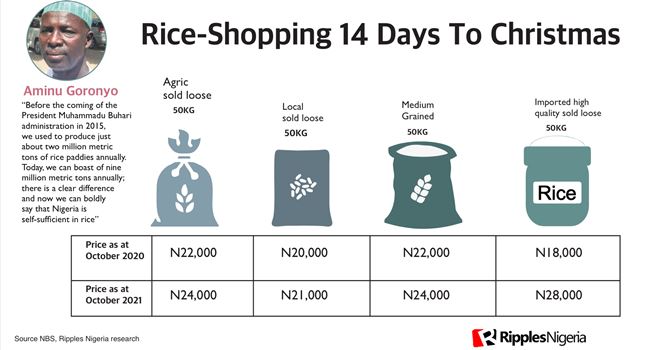Ripples Metrics
ICYMI… RipplesMetrics: Despite interventions, Nigeria is still largest importer of rice in Africa

Despite stringent measures taken by the present administration to stop the importation of rice, Nigeria continues to rely on imports to meet local demands.
According to the most recent statistics from Statista, a data provider, Nigeria is among the top four rice-importing countries, and the largest in Africa.
Statista recorded that Nigeria in 2020-2021 imported 1.8 million of metric tons. Although, the number is a drop of 18.2 percent when compared to the 2.2 million tons in 2017-2018; the high ranking is a clear indicative of the necessity of the staple.
It also confirmed that Nigeria is far from self-sufficiency and food production is growing at a slower pace than the population.
More damning is that Nigeria’s 2020-2021 figure is only behind China’s 2.9 million, European Union 2.45 million and the Philippines 2 million metric tons.
The recently released foreign trade statistics by National Bureau of Statistics (NBS) gives a pointer on how much Nigeria is spending importing food.
While rice import bill is not stated, the data show that in only three months (July to September), the total value of trade in agricultural goods stood at N868.5billion.
These comprised of exports (N79.4billion) and imports (N789.1billion) a huge difference of 893.84%.
Interventions
The Central Bank of Nigeria through its various agricultural programmes in recent months have committed billions in loans and interventions to boost local production of the commodity.
Read also: RipplesMetrics: Data show Buhari spent N4trn on fuel subsidy after calling policy fraud
One of such is CBN special intervention loan, and the IFAN-CBN Anchor Borrowers’ Programme.
The federal government also made importing the commodity illegal, and stopped access to forex for anyone looking to import.
These measures have not only jerked up the price of the commodity to an unbearable level, there is little sign local production is meeting demands.
How is Nigeria fairing in the export front?
India, Thialnd and Vietman were reported as the three top countries on global rice exmport. Nigeria was completely out in the ranking.
However, at a press conference in 2020, former minister of agriculture and rural development, Muhammad Sabo Nanono promised the country will begin exportation of locally produced rice next year (2022).
According to him, if Nigeria should continue at the momentum of production, importation will stop soon.
Ripple effect ahead of Christmas
With Nigeria still relying on importation, it could be a tough Christmas for many Nigerians.
At the end of September 2021, Ripples Nigeria had reported that preparing a rich pot of Jollof could cost at least N10,000 for a family of four.
Using the same ingredients as of January 2017, N7,401 would have cooked the same amount of jollof rice.
This figure could be a lot higher in this month (December) of festivity.
The level of how much food is about to gulp in Christmas spending was recently highlighted in WorldRemit multi-country study.
The report showed majority of Nigerian households spend 196% of their monthly income during Christmas celebrations and majority of the spending will go into food because of the high cost of coveted staple (Rice).
Join the conversation
Support Ripples Nigeria, hold up solutions journalism
Balanced, fearless journalism driven by data comes at huge financial costs.
As a media platform, we hold leadership accountable and will not trade the right to press freedom and free speech for a piece of cake.
If you like what we do, and are ready to uphold solutions journalism, kindly donate to the Ripples Nigeria cause.
Your support would help to ensure that citizens and institutions continue to have free access to credible and reliable information for societal development.

























